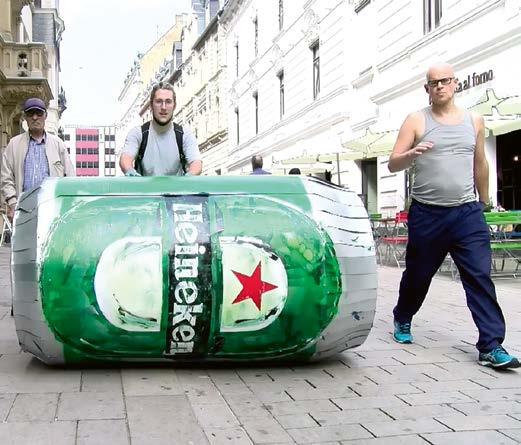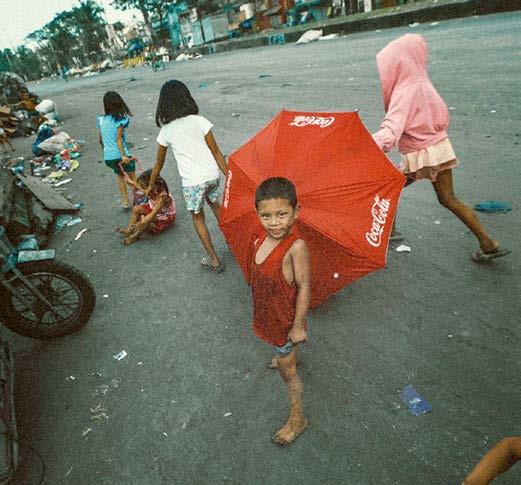
4 minute read
29 Beer at IFFR/CineMart goes
Tiger Short Competition Beer at IFFR
In the 36-minute experimental film Beer, iconoclastic filmmaker Erik van Lieshout pulls off an improbable, if not impossible feat, writes Nick Cunningham.
Advertisement
He accepts an extremely wellendowed art prize (€100,000) without being in any way complicit in the questionable dealings of the megabrand that bears its name.
Just after Erik van Lieshout won the coveted Heineken prize, details of the beer company’s alleged nefarious activities in Africa were published, involving sexual abuse of promotion hostesses.
So what did Van Lieshout do? He did what any self-respecting iconoclast and neo-Surrealist would do, and mounted afull frontal assault on the company, and seemed to have agreat time in the process. In his subsequent film, not only does he bite the hand that feeds him, he also unleashes his most confrontational and disruptive inner self.
Van Lieshout is very funny and is great on camera, and does nothing by half measures. In the film he is mainly housebound, due to aknee injury and so, in the great procrastinatory tradition of the creative artist, discovers the house chores that must be done before he really gets down to business. Butluckily, each chore, whether fixing the bathroom cabinet or levelling afloor, are recorded, documented and used in the film. When he really gets into the swing of things he goes beer mad, unveiling aHeineken green sofa (same pantone colour), rebrands the Yellow Canary pub across as the Green Canary, and has himself rolled through the streets of Wiesbaden in ahuman-size beer can.
Which is all great fun, but he is by nature confrontational, and in the film is delighted to say of Heineken to camera, “they’re aterrible company, they’re raping all over Africa,” before labeling them “colonist exploiters.”
What’s more, he spent asizeable portion of the prize money on helping to construct apharmacy in central Africa to help some of the communities that Heineken’s marketing practices have allegedly harmed.
Beer
Other topics Van Lieshout explores in the film are sex with his wife and masturbation (twice aweek and every day respectively), the creative urge and the fear of aging. He also spends alot of time pulling human shapes on his floor to resemble what seem to be numerous photographs of turds.
“We tried to edit the film really strongly on the Heineken problem, but then it became avery boring film,” Van Lieshout says. “So I had to put in the other stuff which was important for me and the film… But conflict is always the most important thing for me.”
Elsewhere at IFFR, projects by two of The Netherlands’ most vibrant film talents were presented at CineMart 2020.
CineMart goes NL
In Morgan Knibbe’s €1.5m project The Garden of Earthly Delights, 12-year-old drug addict Kenji fights for attention, respect and freedom in the drug-infused slums of Manila.
Meanwhile, he struggles with his sexuality and crosses paths with Dutch sex tourist Michael, who is being torn apart by his dark desires.
Knibbe blazed like acomet onto the Dutch production scene in 2014 with his audacious doc debut Those Who Feel the Fire Burning. Following this, his The Atomic Soldiers won the Golden Calf (Dutch Academy Award) for Best Short Documentary in 2018 and the Dutch Director’s Guild Grand Prize in 2019. David Verbeek’s The Wolf, the Fox & the Leopard is adystopian story about Isa (23) who has been found living amongst wolves. She is brought back to amedical centre only to be kidnapped by an idealistic couple in order to help them build anew, purer world.

Produced by Lemming Film, the 100-minute €2,700,000 project has €127,500 in place from the Netherlands Film Fund (€102,500) and Creative Europe (€25,000). The screenplay is also written by Verbeek.
Garden of Earthly Delights
“The Garden of Earthly Delights will become an explosively colourful, eclectic and grim fairytale in which grotesque images of hellish horror are set against moments of surreal beauty,” Knibbe comments. “The images will have alayered meaning. In the first place, the cinematic form will serve the emotional journey of the main characters, which will become intensely tangible and sensory, mixing gritty social realism with magical escapades.
Co-written with Roelof Jan Minneboo, the Filipino and English-language film is produced by BALDR Film and has €72,500 in place, courtesy of the Netherlands Film Fund (€22,500) and Creative Europe (€50,000). “In order to start any attempt to describe the core of this film, we must look at the animal kingdom and ask ourselves what it is exactly that separates us from them,” says the director. “What we do all day with our oversized part of the brain called the frontal lobe is run simulations, structure the past and project possible future outcomes or even entirely alternative variations on things we have perceived before. What I mean to say here is: we’re storytellers.”
“I see the art of cinema as aspiritual exercise,” he continues. “Something that cuts beneath rational narration. And perhaps, at its core, to begin with, the effort to prevent the destruction of the world is similar to this; aspiritual exercise more than anything else.”
Right now, Verbeek is in postproduction on his feature film Dead& Beautiful, also produced by Lemming Film.










